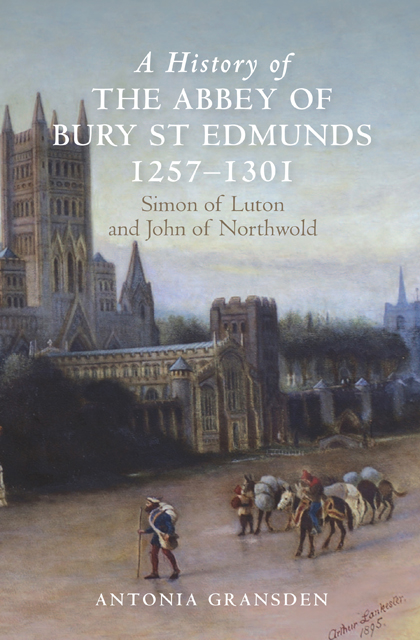Book contents
- Frontmatter
- Dedication
- Contents
- List of plates
- List of figures
- Preface
- Editorial note
- Dedication
- Acknowledgements
- Abbreviations
- Maps and plans (figures 1–11)
- Part I Introduction
- Part II Abbatial Governance
- Part III The Abbey’s Economy
- Part IV Religious Life and Reform
- Part V Intellectual and Cultural Life
- Appendix I The identity of the abbot’s justices, Henry of Guildford and Henry of Shenholt (in 1287)
- Appendix II The monks’ dietary regime: their food and drink
- Select List of the Registers and Customaries Cited
- Select List of Further Manuscripts Cited
- Select Bibliography
- Index
- Backmatter
22 - The Monks’ Intellectual and Cultural Life under Abbot Simon
Published online by Cambridge University Press: 22 February 2023
- Frontmatter
- Dedication
- Contents
- List of plates
- List of figures
- Preface
- Editorial note
- Dedication
- Acknowledgements
- Abbreviations
- Maps and plans (figures 1–11)
- Part I Introduction
- Part II Abbatial Governance
- Part III The Abbey’s Economy
- Part IV Religious Life and Reform
- Part V Intellectual and Cultural Life
- Appendix I The identity of the abbot’s justices, Henry of Guildford and Henry of Shenholt (in 1287)
- Appendix II The monks’ dietary regime: their food and drink
- Select List of the Registers and Customaries Cited
- Select List of Further Manuscripts Cited
- Select Bibliography
- Index
- Backmatter
Summary
Historiography
The line between records and chronicles is a fine one, since the principal purpose of a chronicle is to provide a permanent record of past events. A monastic chronicle includes passages of local interest, directly concerning the monastery in question. Some chronicles consist exclusively of copies of a series of documents often with short connecting narratives, recording affairs of purely local interest: two of these record-type chronicles were compiled during Simon’s abbacy. One is the Processus electionis Domini Symonis abbatis and the other the Processus executorum in re expulsionis fratrum minorum. The Processus electionis comprises copies of a series of official documents, without connecting narrative and imperfectly arranged, and records the process of Simon’s election. Besides copies of documents relevant to the process, it includes copies of the convent’s letters of procuration to those who negotiated on its behalf at the papal curia to obtain Pope Alexander IV’s confirmation of Simon’s election. Also included are letters empowering the convent’s proctors in Rome to borrow the necessary money from cameral merchants. A better example of a hybrid record-chronicle is the later account of the election of John of Northwold’s successor, Thomas of Tottington, in 1302, in which the documents are in proper order with relevant narrative. But neither of these election accounts bear comparison in detail or literary quality with the Cronica de electione Hugonis abbatis postea episcopi Eliensis composed in the 1220s, discussed in volume one of this work. Moreover, with regard to the account of the election of Thomas of Tottington, it should be observed that the chronicle is known only from a copy made in the first half of the fourteenth century, with no evidence that it was compiled much earlier. It strongly resembles in form the Processus executorum, the chronicle recording the settlement in 1263 of the abbey’s dispute with the Friars Minor: as noted above, the only known text of the Processus executorum was copied c. 1330, probably composed in response to the townsmen’s revolt against the abbey in 1327. Because of the numerous documents copied into the Processus electionis and Processus executorum, they differ in kind from the Narratio, the other chronicle concerning the abbey’s dispute with the friars, which (as suggested above) may have been composed, like the Processus executorum, as a result of the 1327 revolt: this is a purely historical narrative, with references to, but without verbatim citations from, documents.
- Type
- Chapter
- Information
- A History of the Abbey of Bury St Edmunds, 1257-1301Simon of Luton and John of Northwold, pp. 241 - 252Publisher: Boydell & BrewerPrint publication year: 2015



